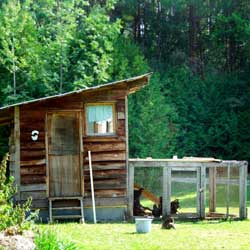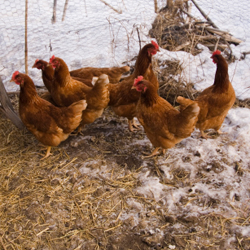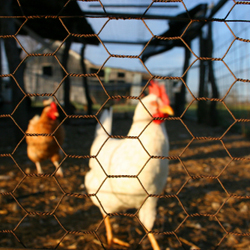It can be fun to keep a few chickens, but even a small flock of hens can quickly lay more eggs than you need. No matter how much your hens are laying, however, those eggs don’t need to go to waste!
About Laying
Depending on the breed, age and general condition of a hen, she may lay just 1-2 eggs each week or could lay an egg every day. There is no need for a rooster for a hen to lay eggs – the rooster is only necessary for fertilized eggs that will become chicks. A hen’s overall health and molting cycle will affect her laying productivity, and climate, daylight levels, temperature and stress can all impact egg production as well.
A hen generally lays her first egg when she is about 20 weeks old, but her laying cycle may not be regular for several weeks. She is at her peak production for about two years before she starts to lay fewer eggs. That means one single hen may lay 100-700 eggs during her peak laying years! What can you do with all those eggs, especially if you have several hens laying at once?
Using Extra Eggs
There are many creative options to use up extra eggs, no matter how many you may get each day.
- New Recipes: If you’re sick of scrambled, hard-boiled or deviled eggs, or your other go-to egg dishes, try experimenting with new tastes and flavors. Eggnog, quiche, casseroles, fritattas, fried rice, dessert curds and pound cakes all use plenty of eggs and can be delicious treats. You can even try pickled eggs or even more unique recipes that could quickly become family favorites.
- Pet Food: Eggs can be a healthy, nutritious addition to your pet’s diet. The protein and amino acids in eggs help keep skin and fur healthy for cats and dogs, and they will eat scrambled or hard-boiled eggs. Even turtles will enjoy the occasional treat of a chopped up hard-boiled egg. Raw eggs, however, should not be fed to pets in case of contamination.
- Freezing Eggs: Eggs can be frozen for up to a year, allowing you to store some extra eggs for times when your hens aren’t laying so well. The eggs have to be removed from their shells, and can be frozen as-is or whipped before freezing. Using an ice cube tray or similar container will freeze eggs into good portions that can be thawed and used just like fresh eggs.
- Share and Share Alike: Your family members, friends, neighbors and coworkers may appreciate some fresh eggs to enjoy. You can use the opportunity to show them how much more flavorful fresh eggs can be, and you could even trade for similar items – extra tomatoes from an aunt’s garden, flowers from a sibling’s flowerbed or honey from a neighbor’s hive.
- Trading and Bartering: It may be possible to trade or barter with your fresh eggs. Other local farmers or gardeners may have extra produce to trade, or a hunter could have meat to trade for fresh eggs. Even contractors could be interested – trading a few dozen eggs for an oil change, babysitting services, a hair cut or other specialized skills may be possible.
- Selling Eggs: If you have the proper licensing and can comply with local laws and restrictions regarding food production, you may be able to sell your eggs at farmer’s market. If your egg production is high enough, you may even be able to interest a local grocery store into carrying your eggs or allowing you to sell them on-site occasionally.
- Donating Eggs: Local organizations may be able to accept donations of farm-fresh eggs, depending on their individual restrictions. Contact your local food pantry or soup kitchen for details, or ask about donating eggs to a senior center or nursing home, or even as part of special events such as a church breakfast or breakfast fundraisers for different groups.
- School Fun: Many schools can use extra eggs, not for eating but for different classroom activities. A science class may dissect unfertilized eggs, or students may arrange incubation for fertilized eggs to raise chicks. An art teacher may demonstrate paint-making methods with eggs, or students may participate in egg drop or egg toss challenges in different classes.
With so many great ways to use extra eggs, you may soon wish you have even more eggs to enjoy!






